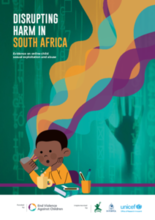Leveraging the unique and comprehensive evidence gathered, Disrupting Harm (DH) identifies practical and actionable solutions to protect children from sexual abuse and exploitation both online and offline. The project was implemented in 13 countries across Eastern and Southern Africa. Below are reports that are now available: Kenya, Uganda, Thailand, Tanzania, Ethiopia, Philippines, Viet Nam, Namibia, Indonesia, Malaysia, Cambodia, Mozambique, and South Africa.
Disrupting Harm in South Africa is the 13th in a series of reports which shares the findings of children’s perceptions of and participation in various online practices, as well as exposes their experiences of online child sexual exploitation and abuse in South Africa.
Disrupting Harm in South Africa has highlighted a number of key areas regarding online child sexual exploitation and abuse:
- Children in South Africa are being subjected to online sexual exploitation and abuse - Between 7-10% of internet-using children, aged 12 - 17 years, were subjected to clear examples of online child sexual exploitation and abuse in the past year. Experiences reported by children included grooming, being offered gifts or money in exchange for sexual acts, and being threatened or blackmailed to engage in sexual acts.
- Taboos and stigma may increase a child’s vulnerability to online sexual exploitation and abuse in South Africa - 48 out of 49 frontline workers said they saw, “taboos around discussing sex and sexuality as a key factor increasing children’s vulnerability to online sexual exploitation and abuse.” Additionally, 65% of frontline workers told Disrupting Harm researchers the stigma within communities is a main reason why children do not report the online sexual abuse and exploitation they endure.
- There is a lack of knowledge about online child sexual exploitation and abuse - 71% of frontline workers indicated that a lack of knowledge and understanding about the risks of online child sexual exploitation and abuse was one of the most significant reasons for the lack of reporting because parents couldn’t provide their children with the appropriate advice.
Extensive data collection took place in South Africa from early 2020 through to early 2021. Data analysis for South Africa was finalised in April 2022.
To ensure cutting edge results from this research endeavour, advice was sought from global experts on the Disrupting Harm in South Africa findings and recommendations. A list of the members of the Panel of Advisors can be found here.
Leveraging the unique and comprehensive evidence gathered, Disrupting Harm in South Africa identifies to protect children from sexual abuse and exploitation, both online and offline in South Africa. The recommendations were discussed at national consultations on 21 June 2022.
ECPAT International – carried out eleven interviews with senior national duty-bearers; carried out a literature review prior to primary data collection which consisted of comprehensive analysis of the legislation, policy and systems addressing OCSEA in South Africa; carried out data collection from non-law enforcement stakeholders; carried out a survey with 49 client-facing frontline workers to explore the scope and context of online child sexual exploitation and abuse in South Africa; interviewed ten criminal justice professionals; and carried out one interview with a young survivor of online child sexual exploitation and abuse.
INTERPOL – collected and analysed both qualitative and quantitative data from national law enforcement agencies, relevant specialised units and partner organisations to measure the scope and nature of OCSEA; and conducted a qualitative assessment on the capacity of national law enforcement authorities to respond to OCSEA cases by interviewing serving officers.
UNICEF Office of Research – Innocenti – carried out a national representative household survey of 2,642 internet-using children aged 12-17 in South Africa. Additionally, 1,393 caregivers of the children surveyed were also included in the study.

